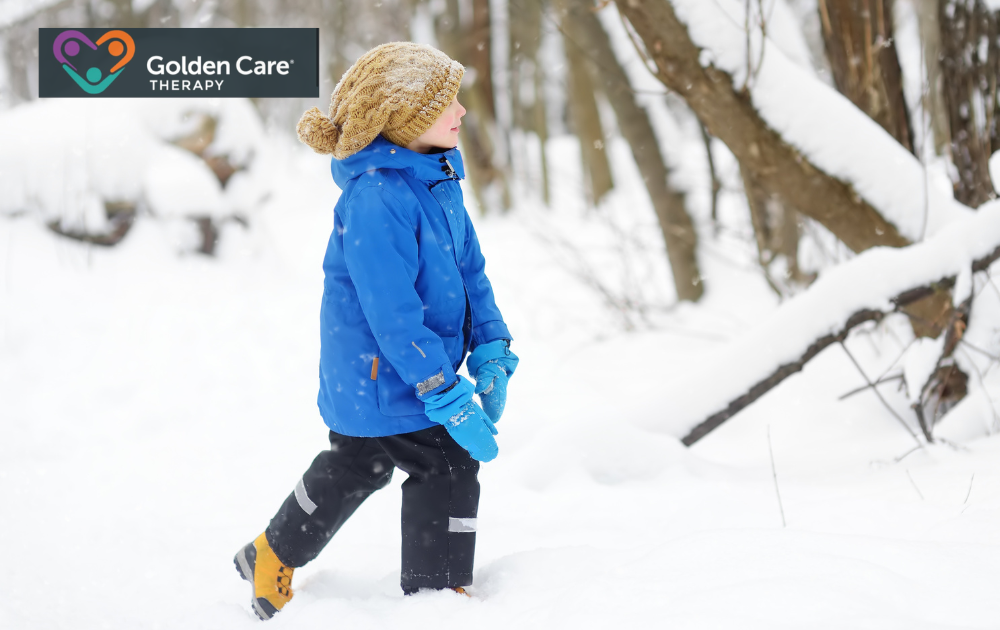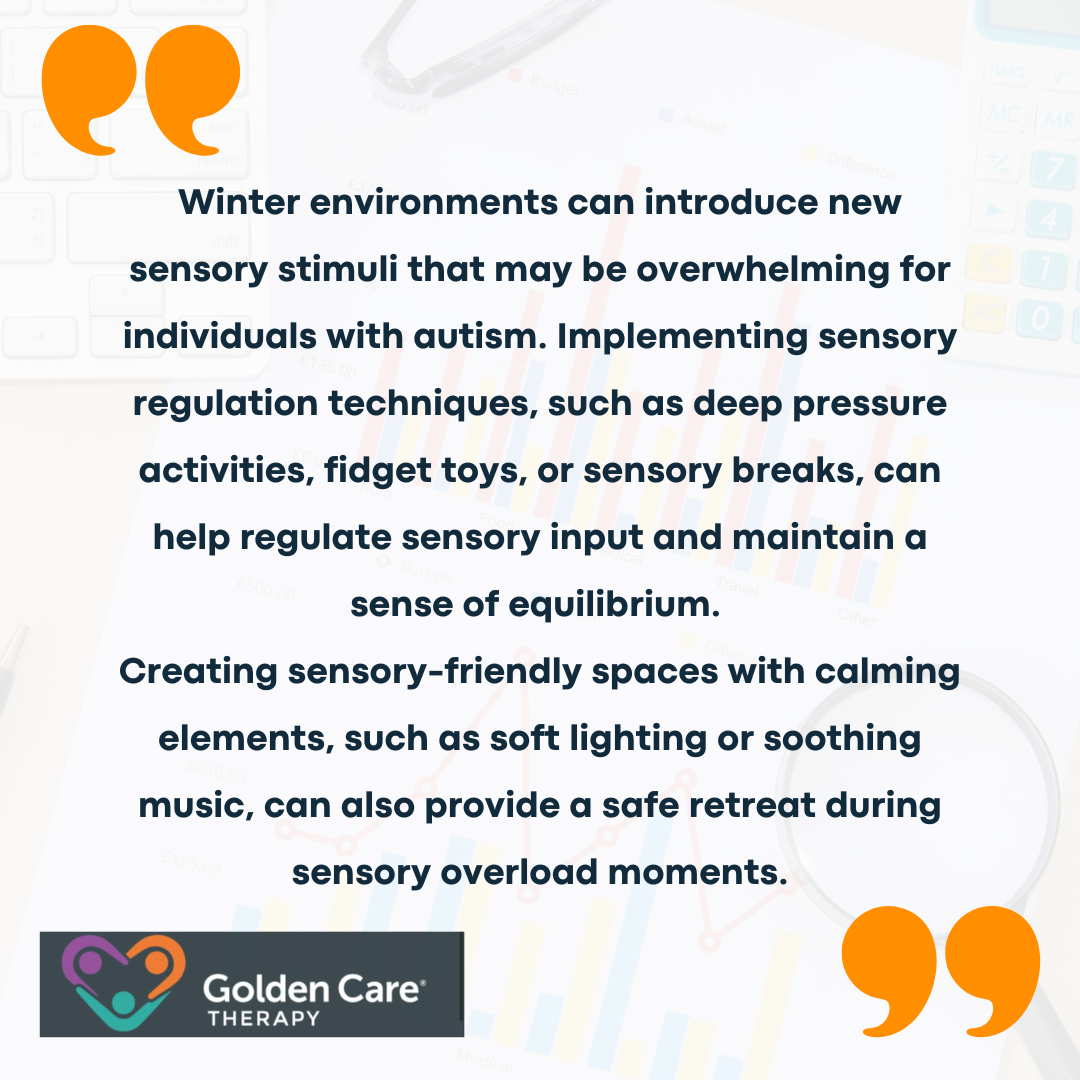The winter season can present additional sensory challenges for individuals with autism. The cold temperatures, strong winds, and wet conditions associated with winter weather can lead to sensory discomfort and heightened sensitivities.
The clothing layers required for warmth, such as hats, scarves, gloves, and heavy coats, may trigger tactile sensitivities or feelings of restriction. Furthermore, the change in routines, holiday decorations, and crowded spaces during winter festivities can be overwhelming for individuals with autism.
Understanding the specific sensory issues that individuals with autism may face in winter is essential for creating an accommodating and enjoyable environment.
Winter Sensory Activities at Home
In this case, engaging in sensory activities at home during the winter season is a great way to provide a comforting and stimulating experience for individuals with autism. Two key activities can be incorporated into the home environment during this time, and these are as follows:
Snow Play and Exploration
Snow play can offer a unique sensory experience for individuals with autism during the winter months. The cold, soft texture of snow can provide tactile stimulation and encourage outdoor exploration.
Building snowmen, creating snow angels, or simply feeling the snow between their fingers can be enjoyable activities for sensory engagement.
Moreover, the visual input of the winter landscape covered in snow, the sound of crunching snow underfoot, and the cool temperature can all contribute to a multi-sensory experience.
To enhance the sensory benefits of snow play, consider incorporating colorful objects or safe scents into the snow, creating a more interactive and engaging sensory environment.
Indoor Sensory Bins and Tactile Play
Indoor sensory bins and tactile sensory activities are excellent options for providing sensory stimulation while staying cozy indoors during the winter. Sensory bins filled with materials like rice, beans, or kinetic sand can offer tactile experiences that promote exploration and sensory processing.
Creating themed sensory bins related to winter, such as using fake snow or arctic animal figures, can add an element of seasonal fun to the activity.
Additionally, including tools for scooping, pouring, and manipulating the materials can enhance fine motor skills development and tactile sensory input.
Tactile play activities, such as squishing and molding clay, playing with textured fabrics, or exploring different sensory toys, can also be beneficial for engaging the senses and fostering sensory processing skills.
Providing a variety of textures and materials for tactile exploration can help individuals with autism regulate their sensory experiences and find comfort in their surroundings.
Outdoor Winter Adventures
For individuals with autism, outdoor winter adventures can provide enriching sensory experiences and opportunities for exploration. Engaging in nature walks in the snow and observing ice formations and winter wildlife can offer a unique and stimulating sensory experience.

Nature Walks in the Snow
Nature walks in the snow can be a calming and invigorating experience for individuals with autism. The peaceful serenity of a snowy landscape, combined with the crisp winter air, can engage the senses in a soothing and grounding manner.
Walking through a snow-covered environment provides opportunities for sensory stimulation, such as feeling the crunch of snow underfoot, observing the intricate patterns of snowflakes, and listening to the gentle sounds of nature blanketed in snow.
These sensory inputs can help to foster a sense of connection with the winter environment and promote relaxation and mindfulness.
Ice and Winter Wildlife Observations
Observing ice formations and winter wildlife can further enhance the sensory experience for individuals with autism. The beauty of icy surfaces, from frozen ponds to icicles shimmering in the sunlight, can provide visual stimulation and spark curiosity and wonder.
Watching winter wildlife, such as birds foraging for food or squirrels navigating snow-covered landscapes, can offer opportunities for sensory exploration and connection with nature.
The sights and sounds of winter animals going about their daily activities can be both engaging and educational, promoting an appreciation for the natural world.
Sensory-Friendly Winter Events
Winter can also be a delightful season for sensory exploration, especially for individuals with autism. Participating in sensory-friendly winter events can provide a unique and enriching experience.
There are two popular options worth considering for such events. These are the following:
Adaptive Ice Skating Sessions
Adaptive ice skating sessions offer individuals with autism the opportunity to enjoy the thrill of ice skating in a supportive and autism-friendly environment. These sessions are specifically designed to cater to the sensory needs and preferences of participants.
Trained staff and volunteers are on hand to provide assistance and ensure a safe and enjoyable ice skating experience for everyone.

Sensory-Friendly Winter Festivals
Sensory-friendly winter festivals aim to create an inclusive and welcoming atmosphere for individuals with autism and their families. These festivals offer a variety of winter-themed activities and attractions designed with sensory considerations in mind.
From light displays to snow play areas, attendees can engage in fun and stimulating experiences while feeling comfortable and supported.
Participating in these activities can not only provide a joyful winter experience but also offer opportunities for social engagement, sensory exploration, and skill development.
Families and individuals need to embrace these sensory-friendly events as they foster a sense of inclusivity and belonging, ultimately enhancing the overall quality of the winter season for everyone involved.
Tips for a Successful Sensory Winter Experience
To ensure a positive and enjoyable winter experience for individuals with autism, specific strategies that can help manage sensory challenges should be considered. By planning, implementing sensory regulation techniques, and prioritizing comfort and safety, both caregivers and individuals with autism can navigate the winter season with greater ease.
Transitioning between activities or environments can be particularly challenging for individuals with autism, especially during the winter months when routines may vary. To ease transitions and manage anxiety, it can be beneficial to create visual schedules or use timers to signal upcoming changes.
Providing clear and consistent communication about what to expect can help individuals with autism feel more prepared and in control.

Lastly, prioritizing comfort and safety is essential when engaging in winter activities with individuals with autism. Paying attention to clothing choices that consider sensory sensitivities, such as using soft fabrics or layering clothing for temperature control, can enhance comfort levels.
Additionally, ensuring that the winter gear, such as gloves, hats, and boots, is well-fitted and non-restrictive can aid in promoting a sense of security and ease of movement.
Final Thoughts
As the winter chill sets in, it brings unique opportunities for fun and learning through sensory activities. Engaging in these activities not only sparks joy but also supports the development of important skills for autistic individuals.
Whether it’s building a snowman, creating winter-themed crafts, or exploring the textures of snow and ice, each experience can be a delightful way to connect with the season. Remember, the key is to follow their lead and embrace their interests.
So bundle up, get creative, and let the winter wonderland become a playground for sensory exploration! At Golden Care Therapy, we provide top-notch autism services in New Jersey, designed to meet the unique needs of each child.
Our dedicated team specializes in ABA therapy, ensuring that your child receives personalized support in a warm and nurturing environment. If you’re looking for exceptional care and support for your child, contact us today to learn more about how we can help!
Sources:

